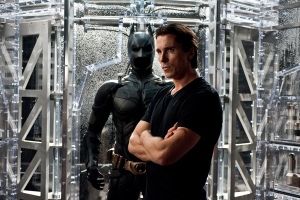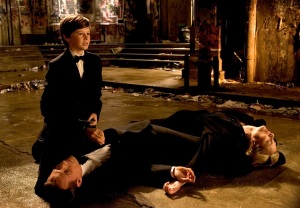Originally Posted July 9th, 2012, at Playeraffinity.com
I like Spider-Man. Who doesn't? He's Spider-Man: he does whatever a spider can. He's a cultural icon, and people who wouldn't be caught dead with a comic book come in droves to see the movies starring ol' web-head. Sam 2002's Spider-Man was a good start for his movie franchise, and Spider-Man 2 set a high-bar for superhero movies everywhere. I even think Spider-Man 3 gets dumped on more than it rightly deserves. So unlike a lot of people, I was cautiously optimistic when Sony announced they'd be making a fourth movie.

The newest entry in the series, The Amazing Spider-Man, may not have carried over any of the original talent behind Sam Raimi's trilogy, but there's still a lot to like here. Andrew Garfield looks the part more than Tobey Maguire ever did, and getting someone as impossibly cute as Emma Stone too play Gwen Stacey was a smart choice. And I really liked Marc Webb's directorial debut, (500) Days of Summer, which seems to have informed a lot of how Webb's approached this multi-billion dollar franchise. Reviews have been positive, and what started out as an 11th hour dead-sprint to the shooting lot has turned out to be adequate summer fare that I'm probably going to go see.
All that being said, part of me wants this movie to fail. That's a pretty shitty sentiment to have, considering the amount of time and care that no went into making the movie (no to mention the jobs that will hinge on its financial success). It's not one I like to have about any movie, unless I think its an unmitigated piece of garbage, or that a win for this one film will come at the cost of those to follow. The Amazing Spider-Man most certainly falls into the latter category, because while it's great that Sony seems to have found a way to differentiate a Spider-Man reboot enough from its predecessors to justify its existence, fortune favouring the reanimation of a franchise corpse that's barely cold sets a worrying precedent for things to come.

It's been no secret that The Amazing Spider-Man exists for reasons other than that it's going to make a bajillion dollars. It's really more about the potential bajillions that could be made with more Spider-Mans. Sony's control of the movie license requires that they make an actual movie out of the property within a certain amount of time, or the rights will default back to Marvel, like they did en masse after a gold rush on comic properties began in the 90's. It's the same reason that "X-Men" movies continue to get released, despite their increasingly tangential link to the original trilogy.
The legality wrinkle explains why Spidey was AWOL while Manhattan was an alien tailgate party during The Avengers, despite the serious bank Marvel Studios would have made with just a cameo. The depressing part is that Sony is basically treating Spider-Man like a toy they have no interest in until their little brother wants it, and then just play with him so that no one else gets to. What's concerning is whether an unspectacular but nonetheless strong debut for The Amazing Spider-Man will inspire other studios to pump out unnecessary sequels/prequels/reboots simply to keep the keys to a franchise.

Christopher Nolan's 'Batman' trilogy is on track to deliver the coupe de grace final chapter in its story that Spider-Man couldn't, but that hasn't stopped Warner Bros. from already talking about rebooting the franchise. Since Warner and DC are nice and cozy under the Time Warner umbrella, there's less legal wrangling at play here, but it's still insane that more than a year out from audiences getting some closure, Warner's attitude is "let it ride!" Even proven failures are getting second lives; Josh Trank, the director behind the inventive and original superhero movie Chronicle, got the chance to join the big leagues by being offered the chance to direct a Fantastic Four reboot. The lesson: if at first you don't succeed, make a sequel. If that fails too, wait five years and hope everyone forgets that the original sucked every which way but at the box office.
Comic books dominate the reboot discussion because it's inherent to the material. Right now, there are seven different lines of comics starring Spider-Man, either in solo fares, as part of a Marvel team, or inhabiting an alternate continuity. The almost non-existent regard for franchise distinction and the space-time continuum means there's no lack of source material for studios to pick from, especially for characters as old as Peter Parker and the dark knight. With so many different story permutations and character tweaks that have built-up over the years, it's not hard to see characters like Wolverine, Spider-Man and Batman becoming James Bond-esque movie properties, where a new instalment sticking to a few core themes and ideas comes out every few years, from a slightly different creative angle.

That in and of itself isn't a terrible idea in the short-term, but eventually, the choice to make the films will be even less dependent on earnest audience interest and the existence of comic book movies will be self-perpetuating, which hasn't always been great for 007. I dare you to find someone who's favourite Bond movie came out between The Spy Who Loved Me and Licence to Kill. When this train of thought crosses over into franchises not based on continual reinvention, it'll be like when the pig flu combined with the bat flu in Contagion: mass destruction on a global scale.
Okay, that's a little overdramatic, but it'll suck hard regardless. One of the movies I'm looking forward to the most this year is The Bourne Legacy, the sequel to the most consistent trilogy of action films pretty much ever. It doesn't have franchise star Matt Damon, or director Paul Greengrass returning, but it does have franchise writer Tony Gilroy taking over for the latter. The layperson won't give a hot damn who Gilroy is though, so the success of "Legacy" will be judged on brand strength just as much as The Amazing Spider-Man. From there, it's not hard to envision Gilroy leaving the series and someone else taking over, turning the franchise into a creative husk of its former self that gets by based on name-recognition.
Well, that's also being pretty worst-case scenario, as there's no reason to think that just because a property's reigns have been handed over to someone new, it's all a business transaction devoid of any inspiration. Part of what makes a series or character great is that they lend themselves to innovative and original stories within their identifying framework. So really, what I'm asking for isn't less of these movies, just that they happen at a slower rate. Give audiences time to miss seeing Spider-Man and Batman on screen, and let their returns occur at a time when it will actually mean something. At the very least, make a movie for reasons more compelling than legal ones. Spontaneity is great for a relationship and routine is a killer; if we start expecting a warmed over rehash of familiar franchises every five years, we'll just have to start looking somewhere else for new entertainment.















